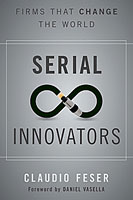 Why do so many successful companies fail to survive and what can be done about it? That’s the question this book seeks to address. As Feser puts it,
“The signs of aging vary from firm to firm. Some firms are blinded by success and begin to resist external views and challenges. Some are locked into mental models and become driven by habits. Some lose the sense of purpose that pervaded them in the early days. Some become bureaucratic. Some have processes and incentive systems that have put them on autopilot, leading in a dangerous direction. Some develop dysfunctional organizational cultures....”
Feser’s aim, is “... to uncover the secrets to building a firm that is adaptive, innovative, and can create significant shareholder value for the long term, sometimes for centuries.”
He does this firstly be investigating bad practice, then good practice, and isn’t averse to looking at unusual examples. As he puts it, “...the Western world’s oldest continuously operating enterprise is the Roman Catholic Church, which has existed in its current form since the fourth century.”
Feser’s best move, however, is to create a complex fictitious case study of Carl Berger, who takes over as head of a global medical products company based in New Jersey, and finds himself facing various organisational and strategic challenges.
The book outlines a particular challenge Carl faces (everything from poor quality and under-motivated staff to terminal cancer), then investigates solutions to those challenges, following Carl as he introduces new initiatives. At times this can give the book a slightly absurd air as whenever Carl faces a new crisis he fortuitiously bumps into someone who gives him a new insight into the situation,
“A week or so later, Carl was on a flight to Zurich... He sat next to a soft-spoken older gentleman. They started chatting.... he was a distinguished professor of psychology... [and] they discussed the professor’s research into human self-confidence and perseverance.... “
Still, this isn’t meant to be a work of fiction (though he’s a good writer, and Carl a compelling figure) but rather an analysis of what causes firms to age. The book is in four parts. Part one investigates the Ephemeral Nature of Firms, Part two, Individual Riguidities and Part three Organizational Rigidities.
Finally Part four gets to the Serial Innovators. Here Feser sums up the previous chapters and parts to state that “informed and thoughtful interventions can interrupt or at least slow down the process fo aging.”
These are:
Why do so many successful companies fail to survive and what can be done about it? That’s the question this book seeks to address. As Feser puts it,
“The signs of aging vary from firm to firm. Some firms are blinded by success and begin to resist external views and challenges. Some are locked into mental models and become driven by habits. Some lose the sense of purpose that pervaded them in the early days. Some become bureaucratic. Some have processes and incentive systems that have put them on autopilot, leading in a dangerous direction. Some develop dysfunctional organizational cultures....”
Feser’s aim, is “... to uncover the secrets to building a firm that is adaptive, innovative, and can create significant shareholder value for the long term, sometimes for centuries.”
He does this firstly be investigating bad practice, then good practice, and isn’t averse to looking at unusual examples. As he puts it, “...the Western world’s oldest continuously operating enterprise is the Roman Catholic Church, which has existed in its current form since the fourth century.”
Feser’s best move, however, is to create a complex fictitious case study of Carl Berger, who takes over as head of a global medical products company based in New Jersey, and finds himself facing various organisational and strategic challenges.
The book outlines a particular challenge Carl faces (everything from poor quality and under-motivated staff to terminal cancer), then investigates solutions to those challenges, following Carl as he introduces new initiatives. At times this can give the book a slightly absurd air as whenever Carl faces a new crisis he fortuitiously bumps into someone who gives him a new insight into the situation,
“A week or so later, Carl was on a flight to Zurich... He sat next to a soft-spoken older gentleman. They started chatting.... he was a distinguished professor of psychology... [and] they discussed the professor’s research into human self-confidence and perseverance.... “
Still, this isn’t meant to be a work of fiction (though he’s a good writer, and Carl a compelling figure) but rather an analysis of what causes firms to age. The book is in four parts. Part one investigates the Ephemeral Nature of Firms, Part two, Individual Riguidities and Part three Organizational Rigidities.
Finally Part four gets to the Serial Innovators. Here Feser sums up the previous chapters and parts to state that “informed and thoughtful interventions can interrupt or at least slow down the process fo aging.”
These are:
- Cultivating the firm’s members’ desire to make a difference
- Building a team of learners at the top
- Framing the vision and strategy positively
- Building on self-managed performance cells
- Promoting the firm’s members' drive to perform and grow
- Investing in capabilities to quickly develop new assets and skills
- Cultivating a culture that fosters execution and promotes challenge








